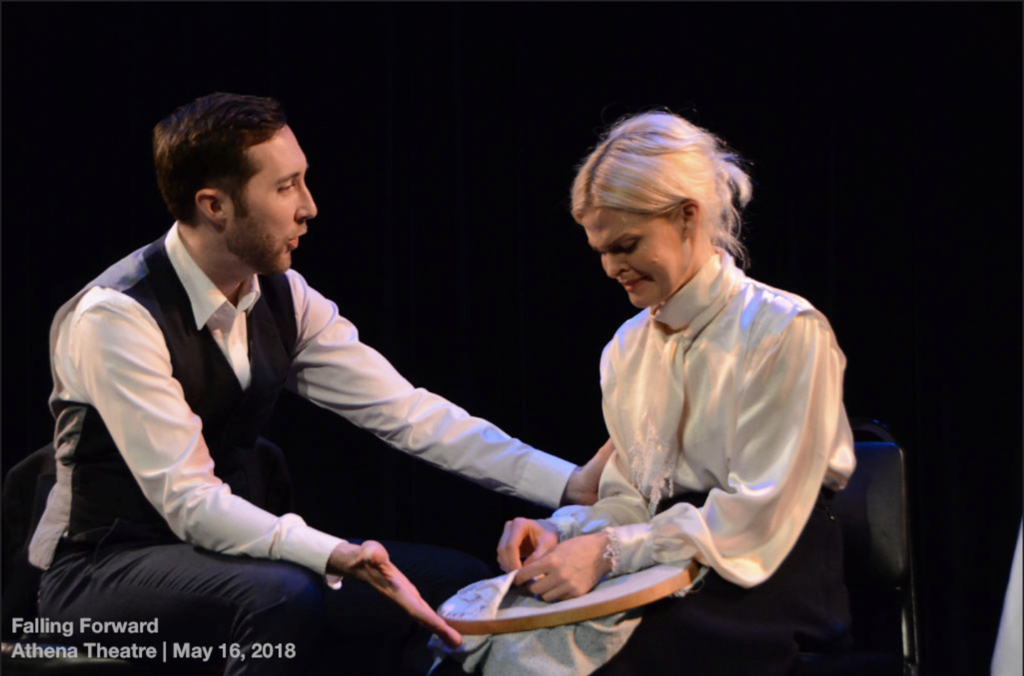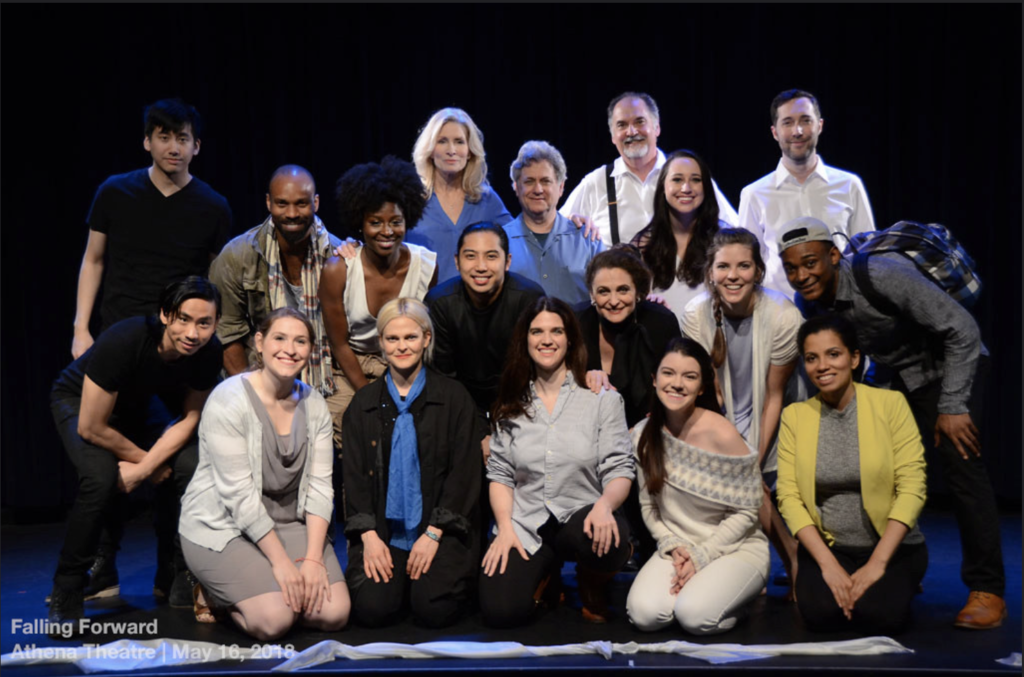Athena Theatre develops off-beat, irreverent, thought-provoking and entertaining new plays that address modern issues. FALLING FORWARD: an evening of ten-minute plays by Athena Writes 2018, performed at Symphony Space on May 16, 2018, is another of Athena Theatre’s successful productions. Without being dogmatic or preachy, FALLING FORWARD’s plays broach topical issues, from guns and domestic violence to gender norms and marriage constructs, by making them personal. The surprising thematic through-line of the evening’s slate of plays, though, is our (we, humans’) aching need to be seen and known.

Thus far this year, there have been nearly 5,000 gun deaths, more than 18,000 gun incidents, and 100 mass shootings in the U.S according to the Gun Violence Archive. It’s no wonder, then, that guns and/or gun violence feature in the plots of three of FALLING FORWARD’s plays: Help Who’s Next by Kathryn Funkhouser; Natural Selection by Marcus Scott; and Shooting Janine by Kate Thomas.
Help Who’s Next presents possible multiverses where a congressman, his social media manager, and a barrista repeatedly intersect after a mass shooting. Ms. Funkhouser’s various iterations of the scene reveal the characters’ inner lives and conflicting priorities, and the unexpected confrontations that result. The play’s final deconstruction of dialogue, where each character spouts snippets of lines and words previously spoken by a different character, is hauntingly moving, and was affectingly performed by Shavanna Calder, Kelsey Peterson, and Steve Hoose.
The eponymous Janine in Ms. Thomas’s play is the personification of a pink rhinestone girly gun. Janine is sexy, empowering, and deadly. And Janine aims to seduce the women who hold her to kill men. All men. Just ask the two sisters who’ve just met Janine in the woods: one of whom killed her shooting instructor at Janine’s behest, and the other may be inspired to kill her husband as soon as she gets home. Actors Lea Garcia-McKenna, Emj Nelson, and Estelle Bajou gleefully inhabited the characters of Shooting Janine, underscoring Ms. Thomas’s play with abundant physical humor.
The opening beat of Natural Selection introduces us to Troy, Trevor, and Travis, three young Asian-American men, as they’re comparing the size of their penises, and it gets a big laugh. But, once the threesome completes that task, the audience must bear witness to the boys’ plot to shoot up their school’s ESL (English as a Second Language) building. This act, they reason, is an expression of their patriotism and full assimilation as Americans. As their individual commitment to their plot wanes and waxes, we learn that, at the heart of their planned mass shooting, is these loners’ desire for fame and recognition.

Two of FALLING FORWARD’s plays explore the strains that absence and secrets place on a marriage. Martha Pichey’s Drowning on Dry Land introduces us to Eliza, a whaling captain’s wife, profoundly dissatisfied with the long periods of separation required by her husband’s profession. She defies societal and gender norms by studying to be a navigator during his absence. Upon his return, Eliza’s demand –that next time, they go to sea together– forces her husband to adjust his image of her (as a stereotypical frail woman), and accept her for the independent, smart (and sexual), partner she is. In A Departure, the playwright, Grant MacDermott, investigates the corrosive effect on a marriage of a spouse’s secret, and considers what is the effect if the other spouse knows the secret but chooses to hide that knowledge? How can either party be truly seen, truly encountered when so much is concealed. Anna Holbrook and Alan Simon portray the long-married couple naturalistically and humorously, but Ms. Holbrook’s performance of the wife’s monologue near the end of the play was breathtaking.
Freddie Jay Fulton’s portrayal of the teenage boy in boys don’t look at boys by Jeremy O’Brian was also impactful. In turns brash, funny, poignant, and vulnerable, Mr. Fulton fully embodied Mr. O’Brian’s multi-faceted, heart-wrenching character. boys don’t look at boys asks what does it take to truly see another? How can we encourage recognition of the vulnerable other, especially among boys and men who are socialized to use humor and a veneer of self-sufficiency to mask weakness? Does it take a crisis to lift the blinders?
In Waiting, or Something Equally Tragic by Leila Teitelman and The Marsh by Nora Sørena Casey, the plays ask: what is a person’s rock-bottom and what does one do when they hit it? Ms. Teitelman’s play deals with the sisterhood’s varying responses to domestic violence, and uses the characters’ waiting for a bus as a metaphor for the emotional reckoning necessary for transition. In keeping with the “failure-to-be-seen” theme of the evening, in both Waiting … and The Marsh, characters purposefully obscure parts of themselves, despite their desperate need for recognition, support, and kinship.
Essay by Sherry Bokser

Author Bio
Sherry Bokser is a NYC-based playwright. Her plays include R/Evolution (Characters Ink), With the Best of Intentions (360 Repco), Sally and Sibyl (The Players), and collaborative work includes The Pulse Project (Steppenwolf Theatre/Judson Church); All Hail (360 Repco); and Marvelous Country (Great Plains Theatre Conference/WPIC Mumbai). Sherry is a member of the Dramatists Guild and the ICWP.
➤ What about you?
When was the last time saw a play that impacted you (perhaps even in-person)…


